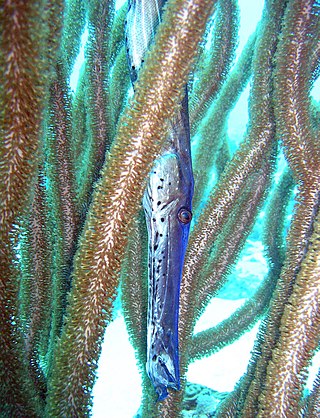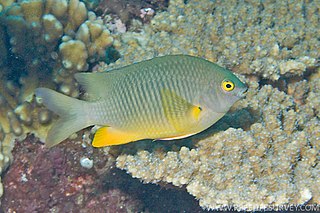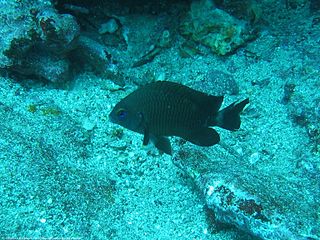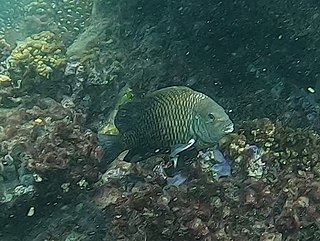
Aulostomus maculatus, the West Atlantic trumpetfish, is a long-bodied fish with an upturned mouth. It often swims vertically while trying to blend with vertical coral, such as sea rods, sea pens, and pipe sponges.

Stegastes is a genus of ray-finned fish in the family Pomacentridae. Members of this genus are marine coastal fishes except for S. otophorus, which also occurs in brackish water. These fish are known by the names of damselfish, gregory and major. They are small tropical fish associated with coral and rocky reefs in the Atlantic, Indian and Pacific Oceans. They are sometimes found in the aquarium trade where they are an easy-to-keep fish, but they do not mix well with other fish of their own or other species because of their territorial habits and aggressiveness.

The Coral Sea gregory, Stegastes gascoynei, is a damselfish of the family Pomacentridae in the western Pacific Ocean at depths between 1 and 30 m. Its length is up to 15 cm. The specific name commemorates the Royal Australian Navy River-class frigate HMAS Gascoyne, from which the type specimen was collected.
Stegastes sanctaehelenae is a species of fish in the family Pomacentridae. It is endemic to Saint Helena.

Fernando de Noronha Environmental Protection Area is a protected area on the island of Fernando de Noronha in the Atlantic ocean offshore from Pernambuco state, Brazil.

Stegastes planifrons is a damselfish from the Western Atlantic. It occasionally makes its way into the aquarium trade.

Stegastes diencaeus, the longfin damselfish, is a damselfish in the family Pomacentridae from the Western Atlantic. It occasionally makes its way into the aquarium trade. It grows to a size of 12.5 cm in length. Longfin damselfish have been reported to have a mutualistic relationship with mysid shrimp of the species Mysidium integrum. The interaction is described as a form of domestication with the shrimp providing nutrients for the algae farms the fish feed on and the fish providing protection from predators.

Stegastes adustus, also known as the dusky damselfish or scarlet-backed demoiselle, is a species of damselfish in the family Pomacentridae. It is found at one- to three-meter depths on surging and wavy coral reefs in the Caribbean Sea, the tropical waters of the western Atlantic Ocean, and the Gulf of Mexico.

Stegastes leucostictus is a species of damselfish found near the sea bed in shallow waters on the western fringes of the Atlantic Ocean. It is commonly known as the beau gregory or beaugregory.

Stegastes fuscus, the dusky damselfish, is a species of bony fish in the family Pomacentridae found near the seabed in shallow waters on the western fringes of the Atlantic Ocean.

Stegastes partitus or the bicolor damselfish is a species of bony fish in the family Pomacentridae found near the sea bed on shallow rocky and coral reefs in the Caribbean Sea, the Gulf of Mexico and off the coasts of Florida.

Stegastes beebei, is a species of damselfish found on coral and rocky reefs at depths between 0 and 15 m. They are somewhat territorial, and chase away small intruders. They are omnivorous, grazing on algae and nibbling at small crustaceans and the tentacles of anemones. They are oviparous, with distinct pairing during breeding. The eggs are demersal and adhere to the substrate. Males guard and aerate the eggs.

Stegastes imbricatus, commonly called the Cape Verde gregory, is a damselfish of the family Pomacentridae. It is native to the tropical eastern Atlantic Ocean.

Stegastes leucorus, commonly known as the whitetail damselfish, the whitetail gregory or the whitetail major, is a damselfish of the family Pomacentridae. It is native to the tropical eastern Pacific Ocean.

Stegastes acapulcoensis, commonly called the Acapulco major, the Acapulco damselfish, or the Acapulco gregory, is a species of damselfish of the family Pomacentridae. It is native to the eastern Pacific Ocean.

Stegastes arcifrons, the island major or Galapagos gregory, is a damselfish of the family Pomacentridae native to the eastern Pacific Ocean. Its range extending from Costa Rica to the Cocos Islands, Malpelo Island, and the Galapagos Islands. It is found on rocky and coral reefs at depths ranging from 1 to 20 m. It is common in many parts of its range, and its population appears to be stable. No particular threats have been identified, and the IUCN rates it as being of "Least Concern".

Stegastes rectifraenum, commonly known as the Cortez damselfish or Cortez gregory, is a damselfish of the family Pomacentridae. It is native to the tropical eastern Pacific Ocean, its range including Baja California in Mexico, and the Gulf of California. It is found on rocky inshore reefs at depths ranging from 1 to 10 m.

Stegastes flavilatus, commonly known as beaubrummel, is a damselfish of the family Pomacentridae. It is native to the tropical eastern Pacific Ocean, its range extends from Mexico, Baja California and the Gulf of California southwards to the Galapagos Islands and mainland Ecuador. It is found on rocky inshore reefs at depths ranging from 1 to 10 m.

Stegastes redemptus, commonly known as the clarion major, clarion damselfish or clarion gregory, is a damselfish of the family Pomacentridae. It is native to the tropical eastern Pacific Ocean, its range extending from the Revillagigedo Islands to the coast of Baja California. It is found on rocky reefs at depths ranging from 1 to 15 m.

Stegastes baldwini, is a damselfish of the family Pomacentridae.


















